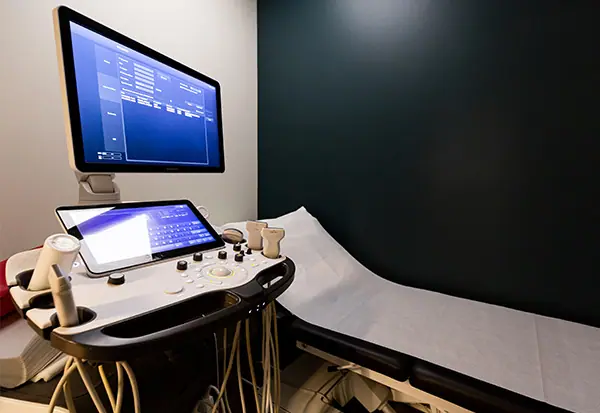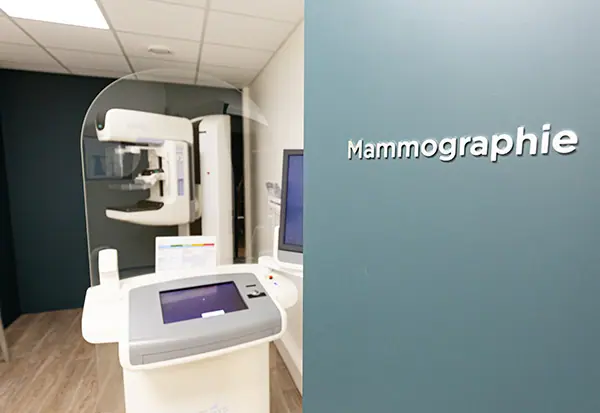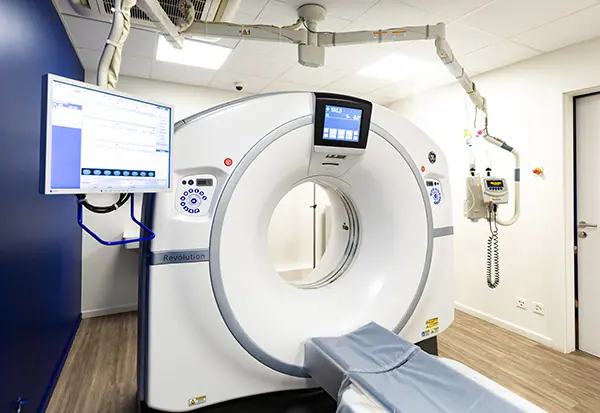MRI
Magnetic resonance imaging (MRI) is an examination that provides detailed views of the body part being analyzed. It uses a magnetic field and radio waves. The objective is to vibrate the numerous hydrogen nuclei that make up the tissues of the human body and thus produce images. An MRI is an examination without radiation and is not painful.
- MRI for adults and children
- Vascular imaging
- Digestive imaging (cholangio-MRI, entero-MRI, liver and pancreatic MRI, defeco-MRI, anorectal MRI)
- Neurological MRI (brain, spine, and ENT)
- Osteoarticular MRI (including arthro-MRI)
- Urogenital MRI (renal and prostate MRI)
- Imaging for women (breast MRI, pelvic MRI)
You must inform the medical team:
- If you have a pacemaker or have had heart valve surgery.
- If you have a disease such as diabetes or kidney failure.
- If you have had surgery within the last month.
- If you have had brain surgery.
- If you may have been pierced with metal projectiles, even a long time ago (especially near the eyes) or if you have worked on metals.
- If you have an implanted device (even temporary) or a prosthesis of any kind.
- If you are pregnant, likely to be pregnant or if you are breast-feeding.
- If you have allergies.
- If you are claustrophobic (you are afraid to take an elevator).
If you are on a therapeutic anticoagulant treatment, please inform our receptionists when you make your appointment and the medical staff when you arrive for your appointment.
- Allow 30-45 minutes per region and up to 2 hours for an entero-MRI.
- For abdominal and small bowel exams, fast (no drinking or smoking) for 12 hours before the exam.
- For an entero-MRI, come to the imaging center one hour before the examination for preparations.
- For a breast MRI, the exam should be scheduled between the 7th and 14th day of your menstrual cycle.
- If you are breastfeeding, you should plan to express milk before the exam. It is recommended not to breastfeed for 6 hours following the injection of a contrast product. This first milk should be pumped and discarded. For more information, our team is at your disposal.
- Previous images corresponding to your pathology
- A list of your medications
- The examination form signed by the prescribing physician
- Your health insurance card or, in case of an accident, the claim number
Our medical staff will accompany you throughout your visit to our centers.
When you are admitted, you will be asked several questions to ensure that you do not have a valve or pacemaker, that you are not pregnant or likely to be pregnant and that you do not have any allergies.
We will ask you to remove some of your clothing as well as any metal items (jewelry, glasses, etc.).
During the examination, you will lie on an examination bed, usually on your back. An antenna will be placed at the level of the area to be examined, then the examination table will automatically enter the device. To obtain the best quality images, do not move and breathe calmly.
An injection of gadolinium-based contrast agent (a product specific to MRIs) may be performed to improve the contrast between the different tissues. This product is normally well tolerated, however, rare allergic reactions may occur. If you have allergies or have had a bad reaction in the past, please tell the medical team as soon as you are admitted.
Rest assured, you are not alone, the medical staff can see and hear you. If there is a problem, a simple press of a button will alert our technicians.
If you have been given a contrast agent, remember to drink about two liters of water following the examination to eliminate the agent.
At the end of the examination, your images and the results will be sent to the prescribing physician.
Rive Gauche:
GE Optima 450W + AW 4.6 12202MR01 / 12202AW01
Rive Droite:
GE Pioneer 3T
GE Voyager 1.5T



